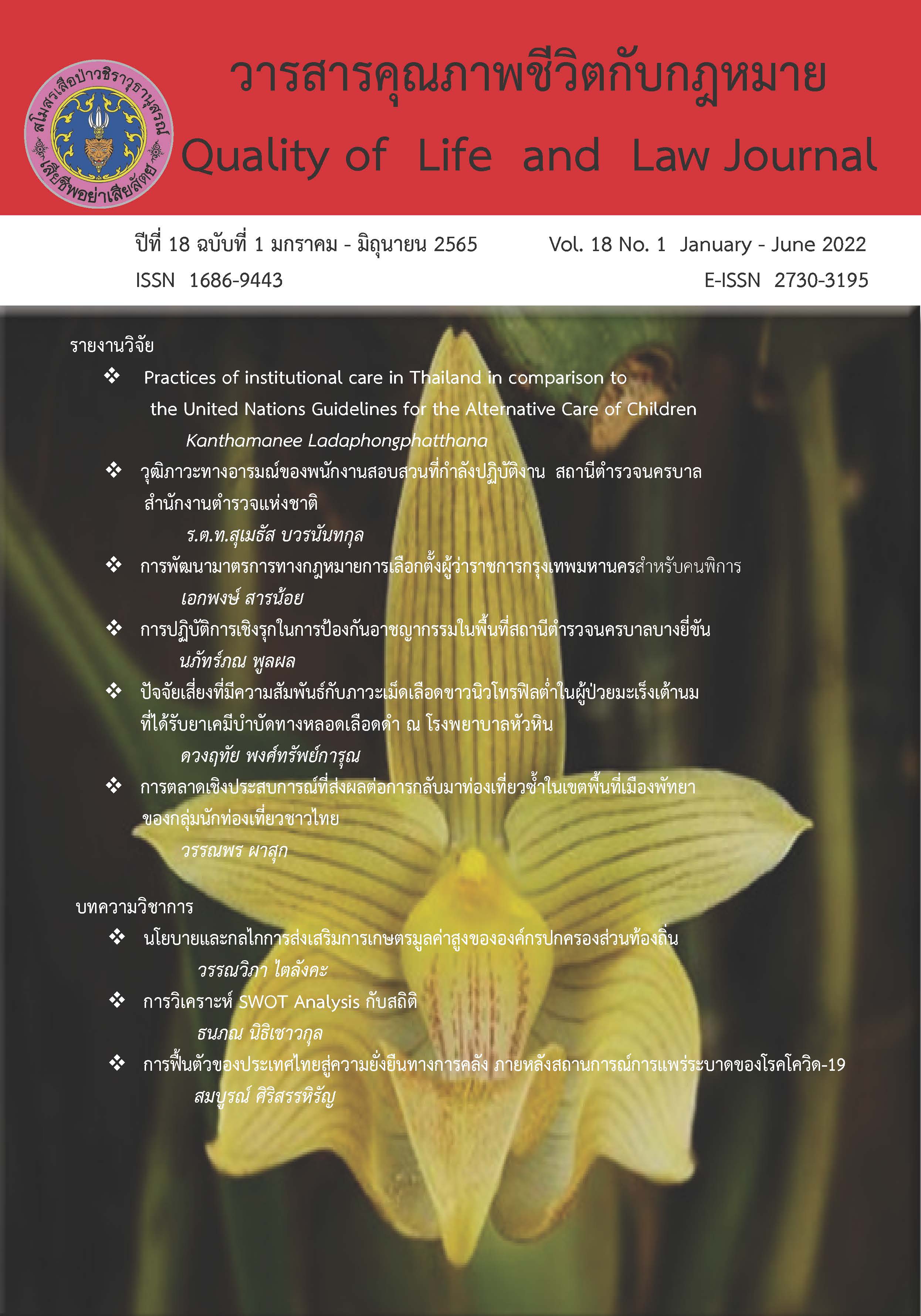Thailand’s Recovering post-COVID-19 Pandemic Better for Fiscal Sustainability
Main Article Content
Abstract
Fiscal sustainability is a key concept and goal of fiscal policy to maintain stability in the medium and long term. The government needs to maintain strict fiscal discipline which covers terms of providing income, budgeting and public debt management. The forecast of Thailand’s public income and debt data for the next 3 years (the fiscal year 2021 - 2023), referring to the past 10 years, data from the fiscal year 2011 - 2020 and Forecasting Thailand’s budget data for the next 3 years (the fiscal year 2023 - 2025) based on 11-year historical data, data from the fiscal year 2012 - 2022, it was found that all 3 issues of fiscal tend to increase steadily. The fiscal status of income in 2020 decreased by 10.01 percent compared to the previous year. The fiscal status of budget in the fiscal year 2022 decreased by 5.66 percent compared to the previous year and public debt fiscal status in 2020 increased by 13 percent compared to the previous year. In the assessment of the fiscal disciplines, it was found that the average of the 3 issues of fiscal discipline was at the level according to the specified criteria. The most common fiscal rules are those that have a higher income target value relative to net realizable income. When analyzing the trend of Thailand’s recovering post-COVID-19 Pandemic Better for Fiscal Sustainability, it was found that adding new sources of income together with the strict and quality budget management, including (1) decentralization to the local treasury; (2) mobilization of assets: invest in new industries;
(3) Thailand’s transparency: upgrading and driving the economy and (4) Conquering Cryptocurrency that is a good recovery trend for Thailand can take concrete steps to be able to continue paying off the public debt that it has created.
Article Details

This work is licensed under a Creative Commons Attribution-NonCommercial-NoDerivatives 4.0 International License.
- บทความหรือข้อคิดเห็นใดๆ ในวารสารคุณภาพชีวิตกับกฎหมายเป็
- กองบรรณาธิการไม่สงวนสิทธิ์
References
จรัส สุวรรณมาลา. (2558). การพัฒนาเศรษฐกิจท้องถิ่นบนเส้นทางการกระจายอำนาจของไทย. ใน สถาบันพระปกเกล้า, ดุลอํานาจ ในการเมืองการปกครองไทย (หน้า 205-234). กรุงเทพฯ: สถาบันพระปกเกล้า. https://www.kpi.ac.th/
ธนาคารแห่งประเทศไทย. (มกราคม 2562 ). บริการทางการเงินดิจิทัลและนัยต่อการดําเนินนโยบายการเงินของไทย. https://www.bot.or.th/
นพดล วิยาภรณ์ และ เอกพร รักความสุข. (2562). การบริหารการพัฒนาโครงการพื้นที่เขตเศรษฐกิจพิเศษ ศึกษากรณี : พื้นที่เขตเศรษฐกิจพิเศษภาคตะวันออก EEC. กรุงเทพฯ : วารสารมหาจุฬาวิชาการ, 6(2), 95-109.
ศาสตรา สุดสวาสดิ์ และ ประสพโชค มั่งสวัสดิ์. (มีนาคม 2555). ระดับหนี้สาธารณะของประเทศไทยกับวิกฤติหนี้. กรุงเทพฯ : Thammasat Economic Journal, 30(1).
สำนักงบประมาณของรัฐสภา. (2564). แนวทางการป้องกันและลดความสูญเสียงบประมาณจากการทุจริต. https://www.parliament.go.th/
สำนักงานเลขาธิการสภาผู้แทนราษฎร. (2563). รายงานวิเคราะห์ของสำนักงบประมาณ ฉบับที่ 3/2563. https://dl.parliament.go.th/
สำนักงานเศรษฐกิจการคลัง. (2562). รายงานสถานการณ์ด้านการคลังปีงบประมาณ 2563. https://www.fpo.go.th/
สำนักงานส่งเสริมเศรษฐกิจดิจิทัล. (ม.ป.ป.). รู้จักกับเงินสกุลดิจิทัล (Getting to Know Cryptocurrency). https://www.depa.or.th/
สำนักงานสภาพัฒนาการเศรษฐกิจและสังคมแห่งชาติ. (2562). รายงานการศึกษาผลกระทบ จากการเปลี่ยนแปลงโครงสร้างประชากร และข้อเสนอแนะเชิงนโยบายต่อการพัฒนาประเทศ จากผลการคาดประมาณประชากรของประเทศไทย. กรุงเทพมหานคร: รายงานการศึกษาผลกระทบ จากการเปลี่ยนแปลงโครงสร้างประชากรและข้อเสนอแนะเชิงนโยบายต่อการพัฒนาประเทศ จากผลการคาดประมาณประชากรของประเทศไทย. https://www.nesdc.go.th/
อรทัย ก๊กผล. (2559). Urbanization เมื่อ “เมือง” กลายเป็นโจทย์ของการบริหารจัดการท้องถิ่นสมัยใหม่. กรุงเทพฯ : สถาบันพระปกเกล้า.
International Monetary Fund (IMF). (April 2021). Fiscal Monitor: A Fair Shot. Washington. https://www.imf.org/
Tanzi, V. (2006). Making Policy Under Efficiency Pressures. Globalization, Public Spending and Social Welfare. In I. Kaul, & P. CONCEIÇÃO, The New Public Finance. Response to Global Challenges (pp. 109-130). New York: Oxford University Press.
The World Bank. (2005). Fiscal Sustainability in Theory and Practice. (C. Burnside, Ed.) Washington, D.C.: The World Bank. https://www.worldbank.org
Transparency International. (2020). Corruption Perceptions Index 2020. https://www.transparency.org/
en/cpi/2020/index/tha
UNCTAD. United Nations. (2020, May). Investment Policy Responses to the COVID-19 Pandemic. Investment Policy Monitor (Special Issue No.4). https://unctad.org/
United Nations. (September 2020). Financing for Development in the Era of COVID-19 and Beyond Part II. https://www.un.org/


